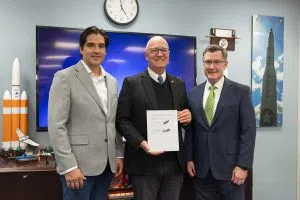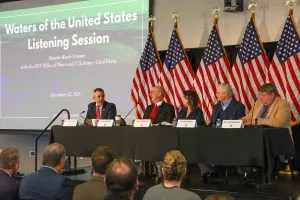 (Mary Steurer – North Dakota Monitor) – Gov. Doug Burgum urged state investments in workforce, housing, child care and educational savings accounts in his final budget proposal Wednesday, arguing the funding is needed to continue what he characterized as an era of prosperity for North Dakota.
(Mary Steurer – North Dakota Monitor) – Gov. Doug Burgum urged state investments in workforce, housing, child care and educational savings accounts in his final budget proposal Wednesday, arguing the funding is needed to continue what he characterized as an era of prosperity for North Dakota.
“You’re facing perhaps the greatest levels of economic opportunity ever presented to any prior assembly in our state’s 135-year history,” he told lawmakers in a nearly two-hour presentation at the Capitol in Bismarck Wednesday morning. He noted the state’s revenues for the current biennium — which ends June 30 — are $392 million ahead of 2023 projections.
The governor’s overall proposed budget for the 2025-2027 biennium is $19.5 billion, representing a modest decrease from the state’s current $19.6 billion two-year budget.
In line with previous addresses, business and workforce recruitment was central to his budget proposal.
“Companies win — and now I know that states win — by attracting two things: capital and talent,” Burgum said.
Burgum’s budget plan puts $53.8 million into workforce-related initiatives, including $19 million for child care and $30 million to the Department of Commerce for programs like legal immigration, marketing and job training grants.
The plan also sets aside $95 million for housing accessibility, affordability and stability and $3 billion into infrastructure, including transportation and water projects.
Burgum urged the Legislature to pivot away from one-time tax relief packages and move toward permanent tax reduction. He criticized property tax relief programs that essentially subsidize taxes for local governments, such as the state government taking on a greater share of educational costs.
“I’m just going to challenge all of you right now to just pump the brakes a little bit here,” Burgum said. “We don’t need to be providing more subsidies — if we do anything, it’s got to be reform.”
The 2023 legislative assembly approved a one-time primary residence tax credit, which allowed most North Dakota homeowners to apply for up to $500 dollars off their 2024 property tax bill. Lawmakers also grew North Dakota’s homestead tax credit, which subsidizes property taxes for seniors and people with disabilities.
Burgum cautioned that relief programs don’t necessarily lead to effective property tax reform.
“I have not yet seen a proposal that allows us to do something that isn’t largely unfair when it’s just a redistribution of money,” Burgum said.
He also pushed for the permanent elimination of the state’s income tax.
“Energy states have figured this out — Texas, Wyoming and Alaska all have zero income tax,” Burgum said. “These are states that we compete directly with for workforce.”
Burgum supported a $515 million tax cut adopted by the Legislature in 2023, which included about $358 million in subsidies to the individual income tax. This package essentially eliminated income taxes for North Dakotans in the lower end of the tax bracket and reduced taxes for high-income earners.
His proposed budget would continue this tax relief for the upcoming biennium, he said.

The governor recommended a new $50 million school-choice program that would give each student an “educational savings account” — essentially, a pot of money they can use to support their individual educational needs.
Families would be able to put that money toward “a menu of approved options,” like extracurricular programs or behavioral health support, Burgum said.
He said the program would supplement, not take funding away from, the state’s existing K-12 budget.
In addition, Burgum’s plan invests millions into the Department of Corrections and Rehabilitation.
The department is facing employment recruitment and retention issues, and is over capacity for both male and female inmates, Burgum said.
He also budgeted an additional $6.5 million into pay equity for corrections employees, as well as for $127.3 million for a new 600-resident facility for the Missouri River Correctional Center, a men’s prison south of Bismarck. The budget also includes $36.5 million to finish a building project for the Heart River Women’s Correctional Center in Mandan.
Burgum acknowledged the role of addiction and mental illness in the state’s growing prison population.
“Over 80% of the people that we have in our care through DOCR have either struggled or are still involved with behavioral health, or the brain disease of addiction,” Burgum said, using an acronym for the Department of Corrections and Rehabilitation.
The governor recommended increasing funding for behavioral health programs by $37 million for the upcoming budget.
In total, Burgum proposes a $6.5 billion general fund for the upcoming biennium. That’s $446.5 million larger than the general fund budgeted for the current budget cycle.
A little over half of that difference is related to salary and benefit increases for state employees, as well as increased expenses related to Medicaid and other providers.
The general fund budget includes a 3% reduction in the operating budgets of executive branch agencies. In May, Burgum asked agencies to “tighten their belts” and make budget cuts in anticipation of slowing state revenue growth.
The state would end the 2025-2027 budget cycle with $165.5 million in the general fund, according to Burgum’s proposal.
House Majority Leader Mike Lefor, R-Dickinson, called the governor’s plan a good starting point.
“That’s a lot of the homework that’s now been done, so we’re going to take a very close look at this to determine how that lines up with our priorities,” Lefor said.
He was complimentary of Burgum’s plan for a bonding package to help finish large infrastructure projects. Lefor said this could save taxpayers money in the long-term, depending on interest rates.
House Minority Leader Zachary Ista, D-Grand Forks, said he liked several elements of Burgum’s proposal — including the investments in workforce — though he’s not in favor of eliminating income taxes.
“I’m looking forward to the incoming administration recognizing that it’s time to move on from that discussion,” Ista said. “We’ve already cut income tax to zero for 60% of North Dakotans, and the 40% of North Dakotans at the top-end of the income scale don’t need another income tax cut.”
Senate Minority Leader Sen. Kathy Hogan, D-Fargo, said she was disappointed Burgum didn’t propose more funding for child care.
“We did $55 million last time, and it wasn’t enough,” Hogan said.
Saying goodbye
Burgum thanked his wife, Kathryn Burgum, for her advocacy for addiction treatment, which included the launch of the Office of Recovery Reinvented.
“There’s always hope for recovery, and that’s part of the message that Kathryn brings,” he said.
He also acknowledged the relationships he forged with North Dakota tribal leaders.
While in office, Burgum pushed for tax-sharing agreements with Native nations, added a permanent display of all five tribal flags outside the governor’s office and helped develop law enforcement partnerships to improve emergency response times on reservations.
“We have to recognize that every enrolled member in these tribes is also a North Dakota citizen, and they want all the same things that we want: economic opportunity, good schools, quality health care, safe communities and a brighter future for our children,” Burgum said.
Burgum, first elected governor in 2016, will leave office Dec. 14. He has been nominated to join president-elect Donald Trump’s Cabinet as secretary of the Interior, and to chair a new regulatory body known as the National Energy Council.
The Arthur native made his fortune selling Great Plains Software to Microsoft.
He will be succeeded by Gov.-elect Kelly Armstrong, who plans to resign from his seat in the U.S. House on Dec. 14. Armstrong will present his own budget recommendations when the Legislature convenes in January.
Joe Morrissette, who will lead the Office of Management and Budget under Armstrong, said those recommendations are still in the works.
He said one way Armstrong’s budget proposal will likely be different from Burgum’s is that it will put a greater emphasis on property tax relief and reform.
“Governor-elect Armstrong has made it pretty clear in his campaign and his message since then that property tax is going to be a priority,” Morrissette said.
Michael Achterling contributed to this report.









